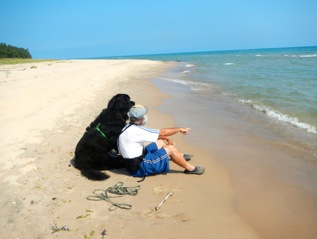 School name: Carroll University
School name: Carroll University
Type of college/university: independent, co-educational comprehensive university grounded in the liberal arts tradition
School locale: Waukesha, WI
Classes I teach:
Introductory Psych; Statistics and Experimental Design; Psychological Testing and Assessment; Experimental Social Psychology; Research Seminar; Specialty Courses (Web 2.0 Learning Tools; Happiness; Why War?; SPSS; Web-based Surveying)
What’s the best advice about teaching you’ve ever received?
Be yourself. Don’t chase after “Best Practices.” Observe and reflect on what makes a teacher (in)effective at engendering learning, resilience, and love of learning. BUT DON’T try to be JUST like that master teacher.
What book or article has shaped your work as a psychology teacher?
Postman and Weingartners (1971) Teaching as a Subversive Activity and most recently, Gardner and Davis’ (2013) The App Generation.
 Tell us about your favorite lecture topic or course to teach.
Tell us about your favorite lecture topic or course to teach.
Statistics and Experimental Design (PSY205). Here is what I tell my students at the start of this class: “Statistics is a way of thinking about things, and is a set of tools for answering questions. Using statistics on a regular basis is the best way to learn this language and to learn how to use statistical tools appropriately. Therefore, it’s very important that you attend labs, work on problems I assign you from the text, and actively participate in data collection exercises. To further help you understand uses of statistics I shall often share with you examples of applications of statistics from my own work of that of student and faculty researchers.”
Describe a favorite in-class activity or assignment.
Collecting meaning data, especially if related to a study recently published in a journal like Psychological Science or which can be used in conjunction with software such as Research Randomizer, SPSS, and Survey Monkey. This gives us data that we can refer to throughout the semester as we learn together.
What teaching and learning techniques work best for you?
In my Statistics class, I give no quizzes or homework per se. There are five regular exams (criterion-referenced) which focus on being able to perform correctly the appropriate data analyses by hand and by computer, to interpret computer output, and to be able to write a report that a motivated layperson would understand. Students also take a comprehensive final examination whose emphasis is on demonstrating mastery of knowing what data analysis to do--and why that particular data analysis is appropriate. I use for a regular text and my own materials. There is a weekly lab taught by me where they learn how to use SPSS. I also introduce some additional software (StarQuiz) which allows for computer assisted review.
 What’s your workspace like?
What’s your workspace like?
Cluttered but the source of much creativity, computation, and collegial conviviality. I have a lab room adjoining my office where six student research assistants continually provide me support and intellectual stimulation. I sit at a desk which has a Dell desktop sitting next to a MacBook Pro and an iPad. They get along. I am surrounded by books and students. My classes are within walking distance of my office. I have an open-door policy and am rarely alone.
Three words that best describe your teaching style.
Playful; Personalized; Patient
What is your teaching philosophy in 8 words or fewer?
Strive for consistent excellence; Listen; Reflect; Learn; Love
What is something your students would be surprised to learn about you?
Until I started college/university teaching, I suffered from a fear of public speaking.
What are you currently reading for pleasure?
The Golem and the Jinni: A Novel (P.S.)
What tech tool could you not live without?
I pride myself on NOT being dependent upon tech tools (but I’ve also been known to blog extensively about them).
What’s your hallway chatter like? What do you talk to colleagues about most (whether or not it is related to teaching/school)?
Alas, I am not known for my small talk--or for standing in the hall. Ars longa, vita brevis.
